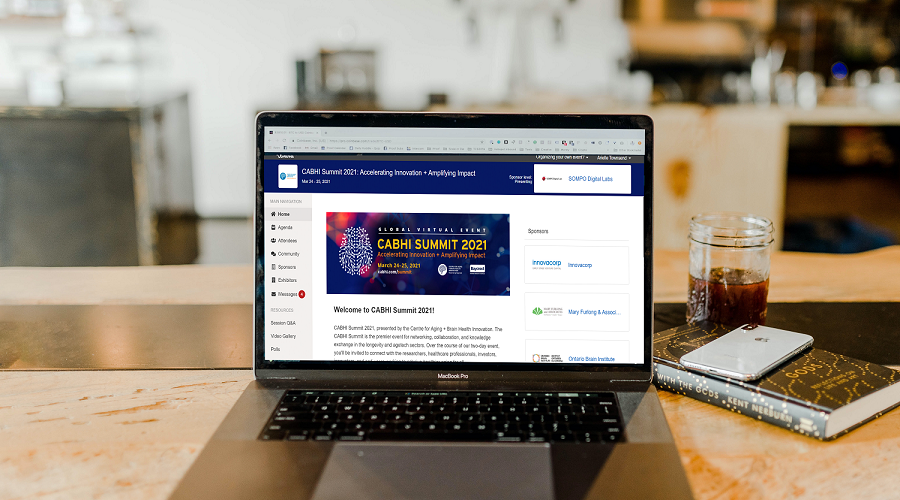The Centre for Aging + Brain Health Innovation (CABHI), powered by Baycrest, held this years’ annual conference on March 24th and 25th. The CABHI Summit was our biggest gathering yet, a virtual conference with more than 800 attendees from all over the world, including 90 speakers, 85 exhibitors, and 11+ hours of dedicated programming.
This year’s theme, “Accelerating Innovation + Amplifying Impact,” shaped a unique focus for each day’s events. Day 1 sessions focused on older adults as innovators, and Day 2 examined the business of aging well. Together, the Summit connected a broad and inclusive global community of the world’s top thought leaders, innovators, investors, researchers, older adults and care partners – the people who make up the aging and longevity sector today.
During sessions, our community chat lines were lively, while exhibitors and attendees networked. Beyond the platform, the #cabhisummit hashtag lit up Twitter. We’re excited by how many people joined us and participated in the event this year, and proud of the insights that emerged. Below, we share some of the Summit’s highlights:
The Leap Forward: Launching a Global Innovation Community of Older Adults
Our first day of programming was targeted to older adults and their care partners, and how both contribute to the innovation community – a pillar of CABHI’s wider work. This holds especially true now: we announced the development of our new global community platform, Leap.
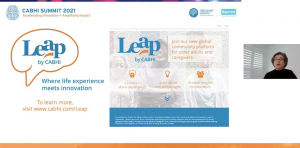
Leap is a radical new collaborative learning, engagement, and innovation acceleration platform for a welcoming and diverse community of older adults, both online and, when circumstances allow, in-person. On the platform, Leap members will:
- Hear about the latest technologies in the longevity market
- Access wellness tools for physical, mental, and brain health
- Test and provide feedback to innovators on the design and usability of their solutions
- Co-design and share their own innovative solutions
- Form connections and exchange stories
- Advocate for an intergenerational age-friendly society that values older adults
We invite everyone to sign up for updates and hear when the platform moves from a testing environment to a full launch later this year.
A key topic of our first day’s events was responding to how older adults have been affected by the COVID-19 pandemic, as well as proposing clear and viable solutions. Today’s sessions shone a light on how innovation can improve older adults’ and their care partners’ daily lives, homes, health, and well-being, and kicked off with keynote Ashton Applewhite, TED Talk Speaker and author of the book, This Chair Rocks: A Manifesto Against Ageism.
Applewhite presented “Still Kicking: Confronting Ageism and Ableism in the Pandemic’s Wake,” in a fireside chat with Dr. Allison Sekuler, Managing Director, CABHI. She began her talk by asking: What would the pandemic have looked like, and how would it have unfolded differently, had we not operated by an ageist belief at its outset that it would “only” affect older people? Probably very different.
Ageism and ableism, though distinct, Applewhite argued, can overlap as “systems of belief about what people are, or are not, capable of.” They often induce deep dread, which we must challenge and reframe. As she and Dr. Sekuler explored, much of our apprehension about growing older is actually about how our minds and bodies will change. To live is to age, and we age well not by avoiding disability, but by adapting to it.
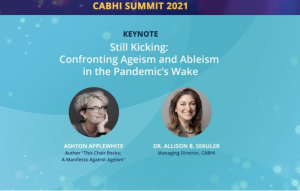
Wednesday’s events integrated more than just panels, as we experienced entertainment, music, dance, cooking demos, and accessible “understanding the science” snippets. For example, attendees could move, stretch, and groove, whether on foot or in a chair, with Baycrest@Home’s Sharing Dance with Seniors, who gave us a taste of their programming, designed by Canada’s National Ballet School to help older adults keep moving.
We also enjoyed American Idol singer, Perrin York, who performed a beautiful medley, followed by a live sing-along with the inspiring intergenerational New Dementians Choir and leader Jennyfer Hatch (a CABHI-supported project that we profiled last year).
Wednesday’s sessions also illustrated how much older adult perspectives must be at the forefront of innovation development. Redesigning the places in which older adults live and approaches to their care was central to our concluding keynote, Moira Welsh, Investigative Reporter, The Toronto Star, and author of the new book, Happily Ever Older: Revolutionary Approaches to Long-Term Care, in her presentation and fireside chat with Dr. William Reichman, President & CEO, Baycrest.
Welsh’s insightful, layered discussion took as its point of departure how, in a society that has too often turned its back on older people, we should shift our focus to building potential – including the potential for change in approaches and services delivery rooted in more progressive models that enable older people to flourish and thrive. One of Welsh’s many inspiring examples was the CABHI-supported Albert Project, which employs projected virtual reality (VR) to support residents living with dementia and reduce the reliance on anti-psychotic drugs (Read our earlier profile of the Albert Project here).
Welsh invited us to adopt these progressive models of older adults’ care on a broader scale. How might we transform older adults’ daily living and overall quality of life, as well as their health, engagement, well-being, and even real joy in life? And how might staff members, too, change, when they become enlivened, not defeated or burnt-out, by their work?
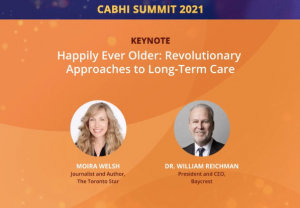 Wednesday panels actively showcased older adults’ active participation, such as on “Inclusive Innovation: Bringing the End User to the Virtual Table,” “Discovery, Access and Lifelong Learning: Digital Immigrants Talk to Digital Natives,” and the demo of “How End Users Inform Innovation.” That last session featured some of CABHI’s own Seniors Advisory Panel members assessing in real time the solutions that select healthtech and agetech innovators presented.
Wednesday panels actively showcased older adults’ active participation, such as on “Inclusive Innovation: Bringing the End User to the Virtual Table,” “Discovery, Access and Lifelong Learning: Digital Immigrants Talk to Digital Natives,” and the demo of “How End Users Inform Innovation.” That last session featured some of CABHI’s own Seniors Advisory Panel members assessing in real time the solutions that select healthtech and agetech innovators presented.
Overall, this day of the Summit revealed the necessity of innovators engaging directly with older adults, not just as users, but as co-designers of solutions. Speakers and performers alike brought to life one of the day’s, and indeed, the new Leap platform’s, guiding principles: “Nothing about us, without us.” Only by collaboration can we build more effective solutions for all.
Enough about Me: From the Caregiver’s Perspective
A centrepiece of the Summit, presented on both days, was our keynote panel led by Richard Lui, Journalist and News Anchor, MSNBC and NBC, and author of the new book, Enough About Me: The Unexpected Power of Selflessness, which draws upon his experience caring for his father.
As a panel, “Enough About Me: From the Caregiver’s Perspective” joined Lui in a candid, heartfelt conversation with two other high-profile caregivers who have cared for their husbands with early-onset dementia: Jill Daum, mom, actor, playwright, and caregiver to her husband, John Mann, beloved singer-songwriter of the band, Spirit of the West; and the Honourable Lisa Raitt, Vice-Chair of Global Investment Banking, CIBC, and caregiver to her husband Bruce, who, like Daum’s, was also diagnosed with a form of early-onset dementia.
For caregivers, the journey from diagnosis to acceptance can be daunting. It’s accompanied by a steep learning curve and many tough and lonely choices. One day, Daum looked at her husband and conceded, “There’s no cure for this.” He replied, “Nope. This is all we’ve got. Let’s make the best of it.”
For all three caregivers, overcoming the stigma associated with dementia led them to embrace their own vulnerability more. In turn, they experienced an enhanced connection to others in their communities, which pleasantly surprised them. They also drew strength from their loved ones’ courage. Lui, for example, spoke of his own father’s capacity to speak openly about his dementia and vulnerability. This inspired Lui himself to also be more open and share his sense of vulnerability as a caregiver, too.
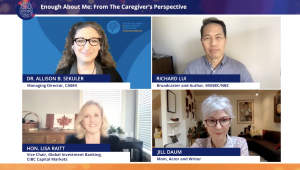
The Business of Aging Well
Thursday’s sessions turned to showcasing innovators’ journeys and outlining strategies for connecting innovators with investors, to better grow and scale their solutions. On that front, this portion of the Summit also gave the audience a sneak peek at 30 promising new companies creating aging and brain health solutions today.
We began the day with an insightful keynote from André Picard, Health Columnist, The Globe and Mail, and author of the new Canadian bestseller, Neglected No More: The Urgent Need to Improve the Lives of Canada’s Elders in the Wake of a Pandemic. Picard echoed some of Welsh’s points from the day prior. He outlined in broad terms the scale of the problems facing older adults in long-term care and articulated several viable solutions to improve older adults’ lives.
For both Welsh and Picard, we cannot wait for a “better” time. The time to act is now.
“What’s required to effect change is not a technical change, but a philosophical one,” Picard stated, “a change of attitude about how we approach these problems.” Echoing Applewhite from the day prior, he called for us to “stop catastrophizing aging,” and hiding people with dementia and older adults away in prison-like facilities where they stay “unseen.” The alternate: keep older people in our communities longer and rely less heavily on institutional models of care. Build more robust home care, adult daycare, and caregiver respite systems – all common goals guiding much of CABHI’s wider work and many of the innovators and projects we support, too.
A key part of CABHI’s work continues to be helping healthtech companies grow and scale, companies that can contribute to re-envisioning and implementing the kinds of economic, philosophical, and policy changes for which both Picard and Welsh advocated. CABHI seeks to foster the growth and scalability of these companies, linking them to opportunities for greater distribution and strategic investment – a central focus of Thursday’s sessions, such as “The Innovators’ Conundrum: Meeting End Users’ Needs and Investors’ Objectives” and “Achieving Global Distribution in Long-Term Care.”
For companies selling newer and complex deep tech-based solutions, such as VR or machine learning to a long-term care facility, for example, one may need to make a case for both the technology and its specific manifestation in a product/solution. If one can demonstrate its practical uses and value on an initial or trial basis, that can lead to distribution.
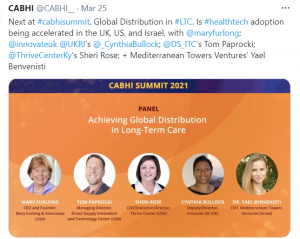 Forward-thinking big (and smaller-scale) ideas for activating and commercializing healthcare research also guides much of CABHI’s current and upcoming work, something that the popular panel, “The Researchpreneur of the Future: Skills and Competencies to Break the Innovation Barrier” explored. It’s one thing to have great ideas; it’s another to actively build a culture of innovation that can foster their emergence, development, testing, growth, and scalability – which then can contribute to changing broader systems and policies no less.
Forward-thinking big (and smaller-scale) ideas for activating and commercializing healthcare research also guides much of CABHI’s current and upcoming work, something that the popular panel, “The Researchpreneur of the Future: Skills and Competencies to Break the Innovation Barrier” explored. It’s one thing to have great ideas; it’s another to actively build a culture of innovation that can foster their emergence, development, testing, growth, and scalability – which then can contribute to changing broader systems and policies no less.
The Longevity Sector’s Largest Combined Pitch Competition
A flagship event of the Summit, its combined pitch competition represented the longevity sector’s largest, with a pool of $1.5 million for the best and brightest agetech, healthtech, and neurotech companies. The combined pitch competition was made possible by an unprecedented collaborative partnership funded by CABHI, the Ontario Brain Institute (OBI), and Innovacorp, with lead sponsorship from our event’s Presenting Sponsor, SOMPO Digital Lab Inc.
First up were the 10 finalists for OBI’s ONtrepreneurs Program, followed by the 20 semi-finalists selected for CABHI’s MC² Capital Program. Each competition had its own panel of judges assessing the strengths of the participating companies’ pitches, which made for some difficult decisions!
Yet as judges Richard Lui and Mary Furlong for the MC2 Capital Pitch Competition noted, the caliber of the companies who make it to this stage indicates just how strong the broader field of agetech, healthtech, and neurotech solutions being developed for older adults are. The CABHI MC2 pitch competition also offered 500,000 Yen ($5,000) for its’ People’s Choice Award, while OBI ONtrepreneurs were awarded in-kind services. As Albert Chu, CEO of Presenting Sponsor SOMPO Digital Lab Inc. made clear when announcing our People’s Choice Award Winners, the variety of companies and their solutions bodes well for the new systems of care that the wider Summit’s speakers called for, to help effect broader social impact and change.
The People’s Choice Award winner for OBI’s Pitch Competition was Linggo, a novel augmentative and alternative communication (AAC) mobile application system that improves communication for individuals with limited-to-no speech, such as people living with dementia, post-stroke aphasia, an acquired brain injury, autism, or other developmental disabilities.
Linggo was also a CABHI-supported project in its early stages as part of CABHI’s Spark program (see our profile here), and here were the five companies selected for the OBI ONtrepreneurs program from the 10 finalists:
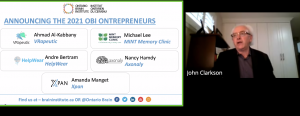
For CABHI’s MC2 Capital Pitch Competition, the People’s Choice Award winner was a tie between Steadiwear Inc., a device supporting the stabilization of hand tremors, and Welbi, empowering senior living community programming tools. Then CABHI announced its 10 semi-finalists for the MC2 Capital Program. These companies will next go through a period of due diligence before being formally selected for the program, which begins in May 2021.
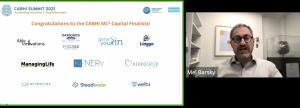 The combined pitch competitions’ two sets of companies reveal how vibrant the aging and longevity sector is. With the right investment, the kinds of ideas being propagated at the wider CABHI Summit truly can take shape to transform the quality of life for older adults, both in homes and in congregate/long-term care settings, and that of their care partners. Whether it’s improved patient transfer systems, better retinal and brain scans, caregiver mental health support apps, or VR-based screening experiences for dementia patients, the companies at this year’s Summit and Pitch Competitions, like the thought leaders who spoke at the Summit, suggests a much brighter future emerging on the horizon.
The combined pitch competitions’ two sets of companies reveal how vibrant the aging and longevity sector is. With the right investment, the kinds of ideas being propagated at the wider CABHI Summit truly can take shape to transform the quality of life for older adults, both in homes and in congregate/long-term care settings, and that of their care partners. Whether it’s improved patient transfer systems, better retinal and brain scans, caregiver mental health support apps, or VR-based screening experiences for dementia patients, the companies at this year’s Summit and Pitch Competitions, like the thought leaders who spoke at the Summit, suggests a much brighter future emerging on the horizon.
Thank you to all of our speakers, exhibitors, partners, and sponsors. We offer special thanks to our Presenting Sponsor, SOMPO Digital Lab Inc., and our Event Co-host, Mary Furlong & Associates, whose generosity made these two wonderful days possible.
Above all, thank you to everyone who joined us – we can’t wait to see you next year!
Subscribe to CABHI’s Community of Innovation Podcast on SoundCloud, Spotify, Apple Podcasts, or wherever you get your podcasts to hear these sessions from the CABHI Summit and many more great conversations!

